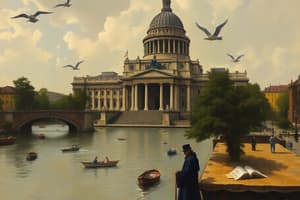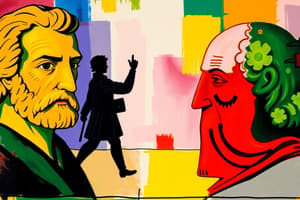Podcast
Questions and Answers
¿Qué concepción fundamental aportó la civilización griega a la ciencia política?
¿Qué concepción fundamental aportó la civilización griega a la ciencia política?
- El reconocimiento de que los seres humanos son inherentemente desiguales.
- La noción de los ciudadanos libres con derecho a participar en asuntos públicos. (correct)
- La creencia en el derecho divino de los reyes para gobernar.
- La idea de que los gobernantes deben ser filósofos.
¿Cómo definieron los antiguos griegos el concepto de 'politiké'?
¿Cómo definieron los antiguos griegos el concepto de 'politiké'?
- La actividad pública y participación ciudadana. (correct)
- La planificación militar y estratégica.
- El estudio de la economía del Estado.
- El desarrollo de leyes y códigos legales escritos.
¿Cuál es la implicación clave de la afirmación de Aristóteles de que el hombre es un 'zoon politikon'?
¿Cuál es la implicación clave de la afirmación de Aristóteles de que el hombre es un 'zoon politikon'?
- Los humanos deben evitar la política y centrarse en el desarrollo personal.
- Los humanos están destinados a vivir aislados y autosuficientes.
- Los humanos son inherentemente egoístas y compiten por el poder.
- Los humanos solo pueden alcanzar su pleno potencial viviendo en sociedad. (correct)
¿Cuál es el objeto de estudio central de la ciencia política según el texto?
¿Cuál es el objeto de estudio central de la ciencia política según el texto?
¿Qué papel juega el 'aparato coactivo' en la definición de poder político presentada en el texto?
¿Qué papel juega el 'aparato coactivo' en la definición de poder político presentada en el texto?
¿Cuál de las siguientes opciones describe mejor la contribución de Aristóteles a la ciencia política?
¿Cuál de las siguientes opciones describe mejor la contribución de Aristóteles a la ciencia política?
¿Cuál fue la principal innovación de Nicolás Maquiavelo en el estudio de la política?
¿Cuál fue la principal innovación de Nicolás Maquiavelo en el estudio de la política?
¿Cuál de las siguientes opciones describe mejor el enfoque de la ciencia política según las definiciones presentadas?
¿Cuál de las siguientes opciones describe mejor el enfoque de la ciencia política según las definiciones presentadas?
¿Cuál es el papel de la observación en el método de la ciencia política?
¿Cuál es el papel de la observación en el método de la ciencia política?
En el contexto de la metodología de la ciencia política, ¿cuál es la función principal de una hipótesis?
En el contexto de la metodología de la ciencia política, ¿cuál es la función principal de una hipótesis?
Flashcards
Political Science
Political Science
The study of politics, originating in ancient Greece, focusing on states, governments, and citizen participation.
Polis
Polis
The Greek term for city-state, where citizens (polites) engaged in public activities (politiké).
Object of Political Science
Object of Political Science
The field's focus on the state (institucionalismo) and power dynamics.
Political Power
Political Power
Signup and view all the flashcards
Zoon Politikon
Zoon Politikon
Signup and view all the flashcards
Aristotle
Aristotle
Signup and view all the flashcards
Niccolò Machiavelli
Niccolò Machiavelli
Signup and view all the flashcards
Method in Political Science
Method in Political Science
Signup and view all the flashcards
Political Science Methodology
Political Science Methodology
Signup and view all the flashcards
Hypothesis
Hypothesis
Signup and view all the flashcards
Study Notes
Introducción a la Ciencia Política
- The origins of Political Science can be traced to Ancient Greece
- Around the 5th century BC, this civilization developed the idea of free and equal citizens with the right to participate in public affairs
- They also discovered that states and governments are human creations, subject to debate, modification, and improvement
- The Greeks referred to their city-states as "polis," their citizens as "polites," and public activity as "politiké"
- Politics was understood as citizen participation in the organization of society and determining who should govern to achieve collective goals
- The importance of politics at that time was captured in the concept of humans as political animals ("zoon politikon") by Aristotle (384-324 BC)
- Humans can only achieve their full development by living in society
Objeto de la Ciencia Política
- The word "politics" comes from the Greek word "polis," meaning city
- It refers to the art of governing nations and encompasses relationships derived from human interaction as a result of living in society
- Political Science focuses on the State (institutionalism) and power, both of which influence political power
- Political power is exercised over a society by "authorized" individuals, backed by a coercive apparatus (the State) to enforce compliance
- Politics can be understood as the science and art of governing, State administration, and the struggle for power based on interests
- The objectives of Political Science include understanding political ideas, ideologies, and institutions such as governmental bodies, NGOs, international organizations, authority and legitimacy, political parties, and the State
- Simple contact with social reality reveals an activity which is commonly known as politics
Precursores de la Ciencia Política
- Key figures in Political Science history include:
- Aristotle is considered a founder of Political Science because of contributions to the theory of government
- His idea presents humans as political beings and the argument presents politics as a means to achieve happiness and virtue in the community
- Aristotle established the use of the observation method, a key element in political science
- Niccolò Machiavelli (1469-1527) introduced "The Prince" (1532), a split between philosophical-moral and political-practical considerations
- Machiavelli focused on the "is" (scientific concern) rather than the "ought to be" (philosophical concern)
- For Machiavelli, the State, a specific area of human action, stands independent of religion, philosophy, and morality
- This independence established a distinct object of study
- The discipline of political science was consolidated as an autonomous field
- Other thinkers include Auguste Comte (France, 1789-1857) and Karl Marx (Germany, 1818, Great Britain 1883)
Definiciones de Ciencia Política
- Political Science seeks verifiable knowledge by investigating existing forms of government
- It describes and explains the factual reality of government actions, struggles revolving around it
- As a specialized social science, it studies social phenomena such as relations, structures, and institutions, as they affect or influence political power
- Political Science examines the public activity of citizens and the republic
- Political Science is the study of power or the State
Método de la Ciencia Política
- The concept of "method" involves three interconnected aspects
- The scientific method involves a procedure, an ordered sequence of steps or actions
- Method encompasses a set of rules applied to this procedure
- It includes a collection of techniques such as observation, classification, and experimentation
- Political Science uses a full range of social science methods, from historical methods and sociological surveys to statistical methods
- Direct observation of studied phenomena is key, allowing for the determination of their fundamental characteristics
- Observation becomes the primary instrument for engaging with political reality
El método de la Ciencia Política
- Method involves how to approach a political, historical, or sociological problem
- The path taken to reach the desired knowledge
- Method is a procedure of an ordered sequence of steps or movement governed by a set of rules
- Summing specific techniques, which includes observation, classification, or experimentation
- The method guides like a compass through the chaos of phenomena
- Method assists in framing problems and finding primordial solutions, as well as provide means of logical steps to reach an objective
- The word "method" comes from the Greek "meta" (beyond) and "odos" (path), meaning a path or way to go further
Los instrumentos metodológicos
- In methodology, it’s important to distinguish between:
- Methodological instruments are techniques applied to understand studied phenomena
- Formulas applied from techniques describe a reasoning path that leads to a conclusion
- Useful data observation methods include:
- Observation: observing and recording phenomena based on research interest
- Case study: limiting research to a specific topic or characteristic
- Interview: engaging in dialogue with individuals who can provide relevant data
- Survey: developing questionnaires for participants in the investigation
- The base extraction of observation provides characteristics presented in occurrences
- It serves as a framework to determine if realities conform to a given observation
La Hipótesis
- A hypothesis is a methodological tool
- The formulation of the hypothesis is a theory that intends to explain the relations between various observed phenomena
- A hypothesis presents suppositions from the observations and is created on a possible relation between multiple observed realities
- Hypothesis characteristics:
- Tentative predictions
- They are based on prior knowledge
- They should be specific and verifiable
- The hypothesis should neither affirm nor deny results from investigation
- The Notion of System:
- A methodological instrument that aids interlinking facts flow reciprocally
- When one fact suffers a change, the other faces correlative transformation
- One units set is identified in a global form, and perceived as a bigger unity
- A system consists of interrelated elements that functions as an organized whole
- Two types of systems are:
- Conceptual or abstract (ideas, concepts, signs, theories)
- Real or material (tangible elements from natural or artificial origin)
Studying That Suits You
Use AI to generate personalized quizzes and flashcards to suit your learning preferences.




